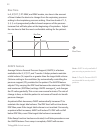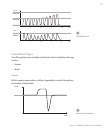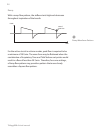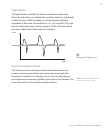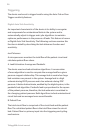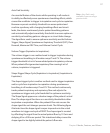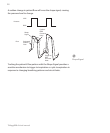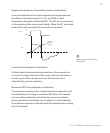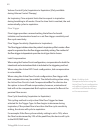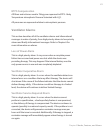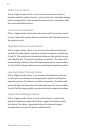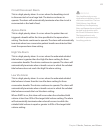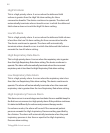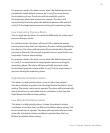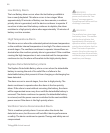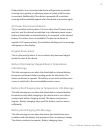Trilogy200 clinical manual
40
Volume Control Cycle (Inspiration to Expiration) (Only available
during Volume Control Therapy)
An Inspiratory Time setpoint limits the time spent in inspiration
during breathing in all modes. Once the time limit is reached, the unit
automatically cycles to expiration.
Flow Trigger
Flow trigger provides a manual setting that allows for breath
initiation and termination based on a set ow trigger sensitivity and
ow cycle sensitivity.
Flow Trigger Sensitivity (Expiration to Inspiration):
The ow trigger initiates when the patient’s inspiratory eort creates a ow
equal to or greater than the ow trigger sensitivity setting. The method of
the ow trigger is dependent upon the circuit type that is chosen.
Leak Compensation:
When using the Passive Circuit conguration, compensation for both the
intentional and unintentional leak is included in the triggering method.
When using the Active PAP Circuit conguration, leak compensation
is not available.
When using the Active Flow Circuit conguration, ow trigger with
leak compensation may be enabled. The default setting when using
the Active Flow Circuit is Leak Compensation On. The clinician has
the option to turn o leak compensation; however, unintentional
leak will not be compensated. Both options measure the ow at the
proximal ow sensor.
Flow Cycle Sensitivity (Inspiration to Expiration):
This cycling method is only active if the Flow Trigger has been
selected for the Trigger Type. As ow begins to decrease during
inspiration, if the patient ow is less than the ow cycle sensitivity
setting, the device will cycle to expiration.
For example: if the ow cycle sensitivity setting is set to 75%, when
the ow has decreased by 25% of the peak ow, the device will cycle
to the EPAP/PEEP level.
Note: Enabling Leak
Compensation when using the
Active Flow Circuit conguration
only aects triggering and does
not aect tidal volume delivery
or Vte measurement.



